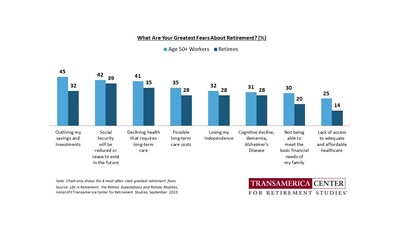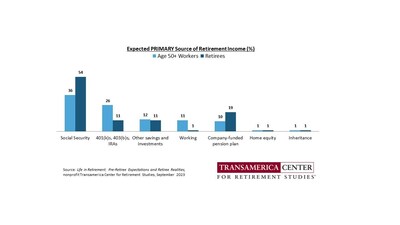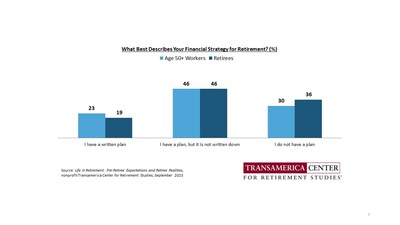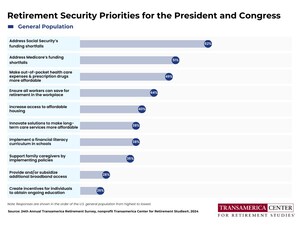New research report describes the retirement insecurities of retirees and age 50+ workers
LOS ANGELES, Sept. 28, 2023 /PRNewswire/ -- Fewer than one in four age 50+ workers and retirees are very confident they will be able to maintain a comfortable lifestyle throughout their retirement (17%, 23%, respectively), according to Life in Retirement: Pre-Retiree Expectations and Retiree Realities, a new survey report released by nonprofit Transamerica Center for Retirement Studies® (TCRS) in collaboration with Transamerica Institute®.
"Retirement brings freedom and time for pursuing personal passions. Our research finds that retirees are happy, purposeful, and have a positive view of aging. However, many are financially vulnerable and risk running out of savings. Their cautionary tale underscores the imperative for strengthening our retirement system," said Catherine Collinson, CEO and president of Transamerica Institute and TCRS.
As part of TCRS' 23rd Annual Retirement Survey, one of the largest and longest-running surveys of its kind, the study compares the retirement preparations and expectations of age 50+ workers with the experiences of retirees. The survey examines their visions of aging and retirement, when and how retirement happens, life in retirement, and their finances.
Greatest Fears About Retirement
"Pre-retirees and retirees dream of travel, spending more time with family and friends, hobbies, and volunteer work. Yet their positive outlook is clouded by financial and health-related fears," said Collinson.
The greatest retirement fear among age 50+ workers is outliving their savings and investments (45% age 50+ workers, 32% retirees), while the greatest fear among retirees is that Social Security will be reduced or cease to exist in the future (42% age 50+ workers, 39% retirees). Many age 50+ workers and retirees fear declining health that requires long-term care (41%, 35%, respectively) and possible long-term care costs (35%, 28%).
Financial Fears About Retirement Are Well-Founded
"Retirees and pre-retirees have limited financial means. Both cohorts are susceptible to the turbulent economy and inflation. A harsh reality is that many lack the resources to cover the cost of a major financial shock. If a market downturn, personal health emergency, or natural disaster strikes, many may find themselves in a dire situation," said Collinson.
Retirees have saved $73,000 in total household savings excluding home equity, while age 50+ workers have saved $133,000 in total household retirement accounts (estimated medians).
Retirees have an annual household income (HHI) of $58,000, significantly less than age 50+ workers' HHI of $87,000 (estimated medians).
Regarding their expected primary source of income in retirement, retirees and age 50+ workers most often cite Social Security (54%, 36%, respectively). As a sign of the evolving retirement landscape, almost one in five retirees (19%) expect to primarily rely on income from a company-funded pension plan, compared with just 10% of age 50+ workers. In contrast, 26% of age 50+ workers expect to rely on 401(k)s, 403(b)s, and IRAs, compared with 11% of retirees. A noteworthy 11% of age 50+ workers expect to rely on income from continued work. Just 1% of retirees and age 50+ workers expect to primarily rely on home equity or an inheritance.
Avoiding Common Mistakes Can Lead to Improved Confidence and Better Outcomes
"Many pre-retirees and retirees are experiencing pitfalls that could be potentially mitigated through improved planning," said Collinson. Fewer than one in four age 50+ workers and retirees have a financial strategy for retirement in the form of a written plan (23%, 19%, respectively).
The survey findings reveal these common mistakes that could be addressed by engaging in more rigorous planning:
- Being overly optimistic about retirement expectations. Two-thirds of age 50+ workers (66%) expect to retire after age 65 or do not plan to retire. In stark contrast, 58% of retirees retired before age 65. The median age retirees retired was 62. Retirees' experience shows how unforeseen circumstances can derail the best-laid plans. Fifty-six percent of retirees retired sooner than planned, with many of them indicating they did so for personal health and employment-related reasons. Yet only 31% of age 50+ workers have a backup plan for income if forced into retirement sooner than expected.
- Overlooking life expectancy and how it relates to time in retirement. While workers have a vision of when they want to retire, many have not contemplated the duration of their retirement. When asked the age they plan to live, 47% of retirees and 39% of age 50+ workers say they are "not sure," which is a reasonable answer but not useful for financial planning.
- Claiming Social Security benefits too early. Retirees receiving Social Security benefits began at age 63 (median). Thirty-one percent began at age 62, the earliest age possible for Social Security retirement benefits – albeit at a 20% to 30% reduced benefit depending on their birth year and the age they are eligible for full retirement benefits. Only four percent of retirees waited to receive benefits at age 70, the maximum age that brings higher benefit payments.
- Taking inadequate steps to safeguard health. More than seven in 10 age 50+ workers and retirees are concerned about health in older age (73%, 74%, respectively). However, few age 50+ workers and retirees say they consider long-term health when making lifestyle decisions (18%, 20%, respectively). Health issues can undermine quality of life, and given the cost of care, they can have a negative financial impact, too.
- Failing to plan for long-term care. Many older individuals experience a decline in health. Just 14% of retirees are very confident they will be able to afford long-term care if needed. Almost half of retirees (46%) indicate that they plan to receive care from family and friends, if their health declines and they need help with daily activities and/or nursing care. Thirty-one percent do not have any plans for long-term care.
- Not seeking assistance from a professional financial advisor, if needed. Fewer than four in 10 retirees and age 50+ workers currently use a professional financial advisor (35%, 37%, respectively).
"Many retirees and pre-retirees are financially fragile due to the evolving retirement landscape and the increasing societal expectation that workers self-fund a greater portion of their retirement income without the knowhow or resources needed to succeed," said Collinson. "Their experience is a call to action for policymakers to modernize our retirement system by paving the way for the successful implementation of the SECURE 2.0 Act of 2022 and addressing persistent structural barriers to retirement security, for example by ensuring that all workers have the opportunity to save for retirement in the workplace and requiring that financial literacy be taught in public schools. Policymakers must also strengthen Social Security and Medicare to ensure their sustainability for current and future generations of retirees."
Life in Retirement: Pre-Retiree Expectations and Retiree Realities provides detailed survey findings about age 50+ workers and retirees. To download the report, visit www.transamericainstitute.org. Listen to our weekly podcast ClearPath – Your Roadmap to Health & WealthSM. Follow on LinkedIn, Facebook, and X (formerly Twitter) @TI_insights and @TCRStudies.
About Transamerica Center for Retirement Studies
Transamerica Center for Retirement Studies® (TCRS) is an operating division of Transamerica Institute®, a nonprofit, private foundation. Transamerica Institute is funded by contributions from Transamerica Life Insurance Company and its affiliates. TCRS and its representative cannot give ERISA, tax, investment, or legal advice. This material is provided for informational purposes only and should not be construed as ERISA, tax, investment, or legal advice. Interested parties must consult and rely solely upon their independent advisors regarding their situation and the concepts presented here. For more information about TCRS, please refer to www.transamericainstitute.org and follow TCRS on X (formerly Twitter) at @TCRStudies.
About the 23rd Annual Transamerica Retirement Survey
The analysis contained in Life in Retirement: Pre-Retiree Expectations and Retiree Realities was prepared internally by the research team at Transamerica Institute and TCRS. A 28-minute online survey was conducted within the U.S. by The Harris Poll on behalf of Transamerica Institute and TCRS between November 8 and December 13, 2022 among a nationally representative sample of 10,015 adults age 18+, including 2,104 retirees and 2,546 age 50+ workers. Data was statistically weighted where necessary for age by gender, race/ethnicity, region, education, marital status, household size, household income and propensity to be online to being them in line with their actual proportions in the population. Respondents were selected from among those who have agreed to participate in our surveys. The sampling precision of Harris online surveys is measured by using a Bayesian credible interval and the worker sample data is accurate to within +1.7 percentage points using a 95% confidence level. This credible interval will be wider among subsets of the surveyed population of interest. Percentages are rounded to the nearest whole percent.
Media Contact: Morgan Karbowski
[email protected]
425-753-5719
SOURCE Transamerica Center for Retirement Studies

WANT YOUR COMPANY'S NEWS FEATURED ON PRNEWSWIRE.COM?
Newsrooms &
Influencers
Digital Media
Outlets
Journalists
Opted In









Share this article